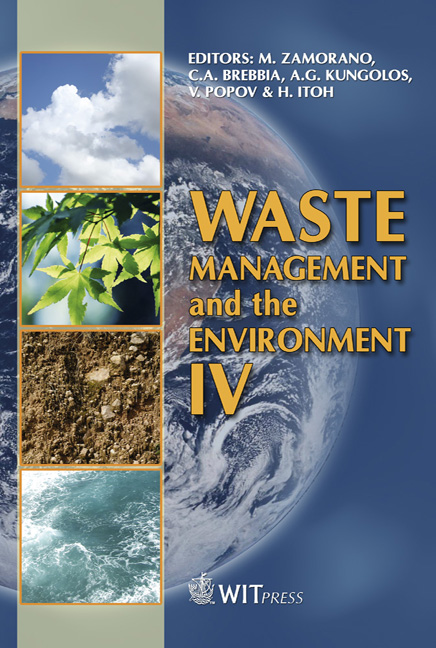Effects Of Recent Strategies Of Selective Collection On The Design Of Municipal Solid Waste Treatment Plants In Italy
Price
Free (open access)
Transaction
Volume
109
Pages
8
Page Range
613 - 620
Published
2008
Size
316 kb
Paper DOI
10.2495/WM080631
Copyright
WIT Press
Author(s)
M. Ragazzi & E. C. Rada
Abstract
In Italy the trend of municipal solid waste (MSW) selective collection shows that the present scenario is changing towards efficiencies that can reach 65% in some regions. In this frame a big problem concerns the planning of treatment plants that could face with the variations in terms of quantity and quality of residual MSW. In order to face with the variability of the selectively collected organic fraction to be treated, composting plants are generally implemented in modules. This flexibility is an advantage when the decision for constructing a plant must be taken when selective collection is not yet steady. Anaerobic digestion is typically implemented in big bioreactors as the ratio surface/volume is more favourable if the volume is high. The anaerobic digesters are heated, thus a limited specific surface of dispersion is preferred. This characteristic gives to anaerobic digestion less flexibility than composting. Facing this disadvantage, some designers propose plants with a set of digesters both for selective collection streams and for the organic fraction automatically sorted from the residual MSW. Depending on the results of selective collection, a digester used for one stream can be switched to the treatment of the other. Bio-drying as residual MSW pre-treatment before energy recovery is performed well when the organic fraction content is high. It is clear that selective collection can be a problem for this process when it causes a low organic fraction content in the residual MSW. Bio-drying cannot develop well in this case. Bio-stabilisation before landfilling can have similar problems. Incineration is presently proposed in Italy as an option to treat the whole stream of residual MSW. Different selective collection efficiencies can change the data for designing this kind of plant. Additionally a problem is related to the high lower heating value obtainable for residual MSW if selective collection of organic fraction is successfully adopted at householder level. The conventional air cooled grate can become unsuitable. Keywords: design, Italy, plants, residual MSW, selective collection.
Keywords
design, Italy, plants, residual MSW, selective collection.





